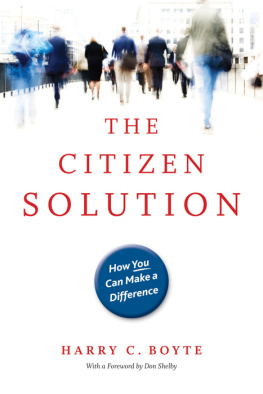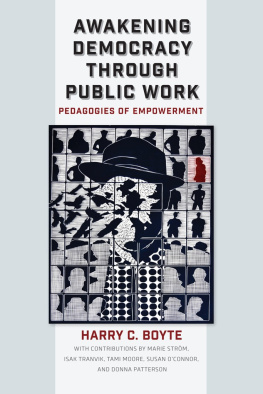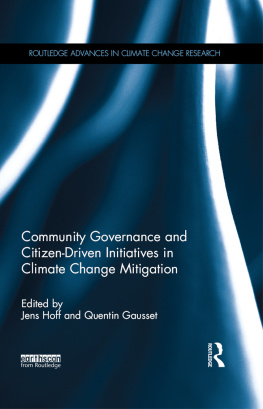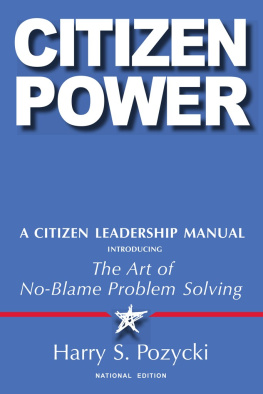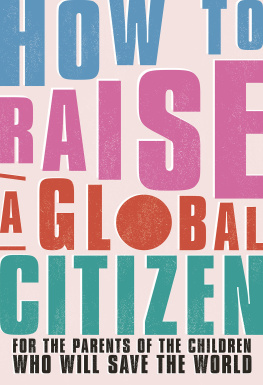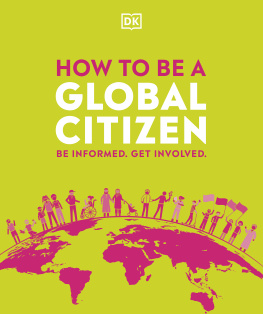The Citizen Solution
The Citizen Solution
How You Can Make a Difference
HARRY C. BOYTE
Foreword by Don Shelby

MINNESOTA HISTORICAL SOCIETY PRESS
in cooperation with the KETTERING FOUNDATION PRESS
2008 by the Minnesota Historical Society. All rights reserved. No part of this book may be used or reproduced in any manner whatsoever without written permission except in the case of brief quotations embodied in critical articles and reviews. For information, write to the Minnesota Historical Society Press, Kellogg Blvd. W., St. Paul, MN 55102 - 1906 .
www.mhspress.org
The Minnesota Historical Society Press is a member of the Association of American University Presses.
Manufactured in Canada
The paper used in this publication meets the minimum requirements of the American National Standard for Information SciencesPermanence for Printed Library Materials, ANSI Z . 1984 .
International Standard Book Number
ISBN : - - 87351 - - (paper)
ISBN : - 87351 - - (paper)
Library of Congress Cataloging-in-Publication Data
Boyte, Harry Chatten, 1945
The citizen solution : how you can make a di ff erence / Harry C. Boyte ; foreword by Don Shelby.
p. cm.
Includes bibliographical references and index.
ISBN- : - - 87351 - - (pbk. : alk. paper)
ISBN- : - 87351 - - (pbk. : alk. paper)
E-book ISBN:- : - - 87351 - -
. Political participationUnited States. . Citizens associationsUnited States. I. Title.
JK 1764 .B 2008
. 0240973 dc
2007049707
The publication of this book was supported through a generous grant from the Richardson B. Okie Fund for Public Affairs.
Acknowledgments
The Citizen Solution grows out of a long collaboration between the Center for Democracy and Citizenship ( CDC ) and our colleagues at the Kettering Foundation. Kettering has supported many CDC research projects into topics as diverse as populism, community-based learning, patterns of decision making in immigrant communities, young peoples civic education, how people shift from seeing themselves as consumers to seeing themselves as powerful public actors and problem solvers, low-income parent involvement in childrens education, the civic mission of higher education, and public scholarship. Beyond specic research e ff orts, Kettering and its wide-ranging, international network of associates and partners has created a remarkable learning community for exchange and development of ideas about democracy, citizenship, politics, and public work. I am deeply appreciative. I want to thank especially David Mathews, president of Kettering, for outstanding intellectual leadership on questions of deliberation, public work, and education; John Dedrick, director of programs at Kettering, who is a ne political theorist with keen insights into the temper of our times and a superb critic of my writing; and Debi Witte and David Brown, who coordinated the several-year conversation on the relationship between higher education and democracy described in Agent of Democracy: Higher Education and the HEX Journey.
As The Citizen Solution has been drafted and redrafted, I have beneted from the thoughts of many other partners and colleagues, too numerous to mention. But I want to thank Nan Skelton, Bill Doherty, Dennis Donovan, Elaine Eschenbacher, Jim Lewis, Ellen Tveit, Gary Cunningham, Al Quie, Atum Azzahir, Tim Kamenar, Doran Schrantz, Jeanne Ayers, Catherine Eichers, Peter Levine, Xolela Mangcu, and Michael Edwards for their regular and continuing conversations about this project and its themes. Carmen Sirianni and Fiona Donald went through the entire manuscript and made many helpful suggestions. And I am very grateful to Marilyn Ziebarth at the Minnesota Historical Society Press, for her assiduous editing.
I owe the most, far and away, to Marie-Louise Strm, my life partner and amazing coworker. Marie su ff ered late night discussions and early morning wake ups. She read many drafts. And she brought her demanding expectations and passion for democracy education and development to bear throughout. The Citizen Solution would not have seen the light of day without her.
Contents
Foreword
DON SHELBY
The Citizen Solution: How You Can Make a Difference is a deceptively simple title for a book. Most of us cut our civics baby teeth on the notion that we, the people, navigate our ship of state. What, then, could this book teach us? Harry Boyte doesnt teach us, so much as remind us, that citizens produce our society and government and do not simply consume its culture and services.
The Citizen Solution conveys its message by examples, and as a storyteller I learned long ago that people learn lessons best when lessons are wrapped in stories or parables. Having spent a good portion of my professional career in journalism bemoaning the loss of public participation in our own lives, I am thrilled to see Boyte provide case after case of citizen problem solving right here under our noses.
Most of us believe we know what citizenship means, but Boyte shows us, in this wonderfully readable book, what citizenship looks like in action. We need the examples, because we dont fully comprehend the real meaning of this common, and perhaps, overused term: citizenship. My own notion, now informed fully by this book, comes from my third-grade teacher, Marjorie Quick. While it may come as a surprise to younger readers, school report cards once made room for grades in citizenship. When I handed over my report card to my father, I knew what he would do. He would look past the grades in English, Math, and History and ip the card over to see how I scored in Citizenship. The only acceptable grade was an A.
Once, in the third grade, I got a B in Citizenship. My father was ashamed. I was confused, because the truth was that I had no idea what citizenship was nor how I was being judged. The next day I asked Mrs. Quick, What is citizenship, anyway? She smiled beatically, as though shed been waiting a very long time for the question. Honey, she said (in those days, teachers could use endearments for their young charges), Citizenship means how well you work with others. First you try to become the best person you can be. Then you help others to do the same. Then, together, you work to make this the best classroom in the school. If everyone is a good citizen, working together, think what a nice school we will have. Then, when you are older, you will work with others to make a good neighborhood, community, and town. Then, what I hope is that you will grow into an adult who will work with others to make a better state, and a better country, and even a better world.
Ive never heard a better description of citizenship, nor have I ever needed one. Mrs. Quicks kind of clarity has, over these past fty years, been lost to many of us. Citizenship has been conated with nationality, politics, and reductionist patriotism. In The Citizen Solution: How You Can Make a Difference, Harry Boyte makes plain what working well with others looks like and what a nice place we can make if we follow, and replicate, the citizenship of the men and women and groups highlighted here. And, like Mrs. Quick, he gives us a little homework to drive home the lessons.
When I nished this book I was reminded of the words of another woman, a citizen warrior for womens rights, Hannah Whitall Smith, who said, There are people who make things happen, and there are those who watch things happen. And there are those who wonder what happened. Harry Boyte obviously likes people who make things happen.

